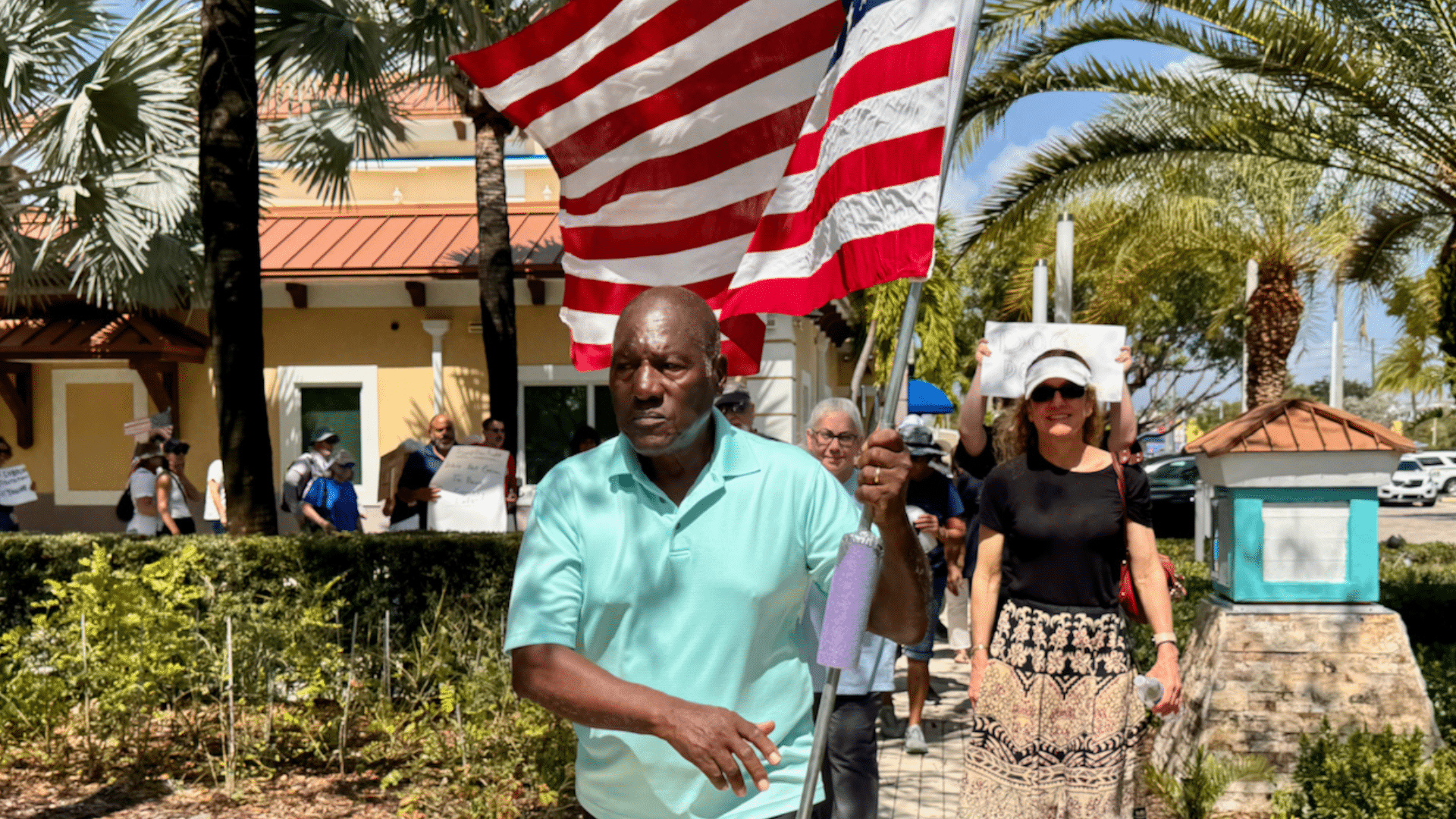Marvin Dunn’s unlikely revolution in Republican Florida.

Marvin Dunn marching in Florida on 16 March 2025. (Credit: Katharine Lake Berz)
This article was produced exclusively for News Decoder’s global news service. It is through articles like this that News Decoder strives to provide context to complex global events and issues and teach global awareness through the lens of journalism. Learn how you can incorporate our resources and services into your classroom or educational program.
It is 3 p.m. on a hot Sunday afternoon and dozens of people have gathered on a busy street in Miami, Florida, one of the Republican strongholds in the United States, to protest actions by Governor Ron DeSantis and President Donald Trump, both Republicans.
Some people carry placards defending Black rights. Others wave U.S. flags. Many cheer at cars that honk as they drive by.
All are here because Dr. Marvin Dunn, a retired Black history professor inspired them.
The elderly man with short grey hair has been spending much of the past two years speaking about the importance of teaching the truth. His messages of resistance have now reached thousands of people and are inspiring a growing movement to preserve and protect civil rights amid contentious debates over state and presidential policies that disadvantage minorities.
“I fear for my country. I fear for the future; for humankind,” Dunn said in an interview, before stepping forward to address the crowd. “What I am seeing in Florida and in our country is the breakdown of democracy in a way that … I could never have imagined.”
Overcoming adversity
Dunn’s lined face carries the gravity of years spent fighting against injustice. He still recalls his great-grandmother’s hands — scarred and gnarled from decades of cotton picking as an enslaved person. She lived her entire life without owning shoes or learning to read. At mealtimes, she had no choice but to scoop food with her bare hands from a shared trough that spread devastating illnesses.
Dunn often speaks with Florida high school students to reveal forgotten Black stories. Dunn draws from his personal experiences to show the tough times Black people faced in Florida’s past. He speaks about how white people shot at his father’s house when it was time to vote and how he once, as a small boy, stumbled across the roaring fires of a meeting of the Ku Klux Klan, a white supremacist organization that long terrorized Black people in the United States, primarily in southern states.
He recalls picking through discarded books from a white high school because his Black school was given so few books.
Black rights in Florida have significantly improved over Dunn’s lifetime. He witnessed the end of segregation in public spaces, including water fountains, bathrooms, restaurants and hotels. He heard the speeches of Martin Luther King, Jr. and lived through the passage of federal laws protecting voting rights and banning discrimination.
But this progress has been interrupted. Over the past five years, Florida’s Republican Governor, Ron DeSantis, has been rolling back minority rights to appeal to conservative hardliners. As part of an array of bills, called the “Slate of Hate” by opponents, DeSantis has restricted classroom discussion of race and banned hundreds of books on racism and sexual orientation.
Rolling back progress
Florida teachers are now barred from saying that people can be oppressed based on their skin colour and that slavery only harmed Black people.
Instead, teachers must show “how slaves developed skills which, in some instances, could be applied for their personal benefit.” They must say racial violence was perpetrated by and not only against African Americans. If a parent complains about a book making a white child “feel guilty,” it can be banned.
“The state has intruded into the classroom to an extent that teachers are frightened to death to teach about controversial subjects that they taught for years,” Dunn said in an interview last year.
In response, Dunn began “Teach the Truth” tours, in 2023, to reach children and teachers who were no longer learning about Black history. He takes high school and college students and teachers to Florida sites where Blacks were killed in racist attacks. One of these sites is Ocoee in central Florida, where 30 to 80 Black people were shot and lynched in 1920 as a warning to other Black citizens who dared to vote.
At another massacre site, called Rosewood, Dunn takes groups down a dusty dirt road to a wooded area he is converting into a memorial park. In 1923, white mobs burned the homes of the thriving Black community and killed almost all the townspeople because of false allegations that a Black man had assaulted a white woman.
Banning more than books
Most weekends, Dunn spends time in Miami’s impoverished Overtown neighbourhood — originally called “Colored Town” — tending to a community garden that he established last year. The Teach the Truth Garden is the only place in Overtown that has grass and Dunn welcomes all to enjoy the space. He gives the produce from the garden to needy people in the community. He also hosts exhibits and events about Black history and gives away books that the state has banned.
When I visited, Dunn gave me Amanda Gorman’s “The Hill We Climb,” which includes a poem that Gorman famously read at President Joe Biden’s 2021 inauguration. The book was banned in Florida schools after a parent complained that it confused and indoctrinated children.
“The real harm that’s being done here is not banning books, but banning ideas,” Dunn said.
Despite approaching his 90s, Dunn shows no signs of slowing his activism. At the demonstration on the streets of Miami, he brought people with different backgrounds together to share their hopes and fears about the future of the United States. He knows that change begins with individuals who refuse to be silent.
“Most significant change bubbles up from the bottom and that’s what is happening here. We are seeing the change coming, not from the top but from the street level,” he said, motioning to the crowd.
As he holds high a giant American flag, Dunn’s weathered hands mirror those of his great-grandmother. Only these hands aren’t picking cotton, they are planting seeds of revolution.
Three questions to consider:
1. In what ways is the government of Florida trying to roll back civil rights?
2. Why is knowing the history of your state or country important?
3. Would you rather not know if your ancestors had done bad things?

Katharine Lake Berz is a freelance journalist who writes about how national and international issues impact people. Her work has appeared in the Toronto Star, The Globe and Mail, CBC, Broadview, The Canadian Press, TVO, National Post, the Walrus and News Decoder. Before becoming a journalist, Katharine was a consultant at McKinsey & Company. She holds a Bachelor of Commerce from Queen’s University in Kingston, Ontario, and a Master of Philosophy in International Relations from Cambridge University.
